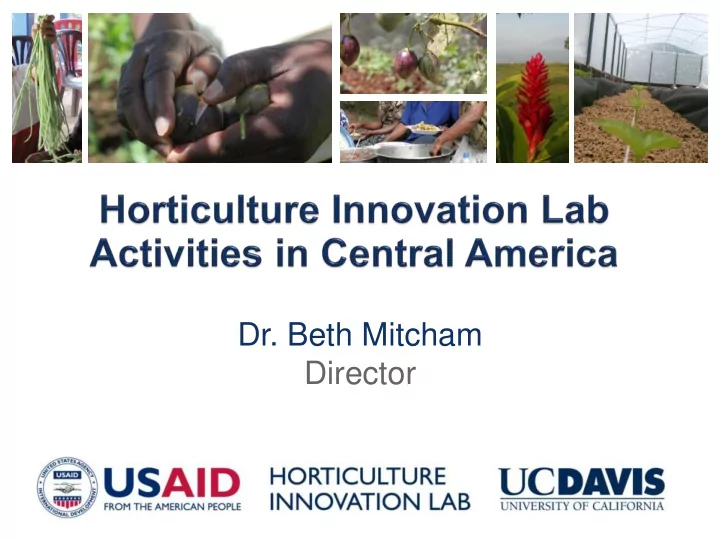

Dr. Beth Mitcham Director Meeting Title/Date 1
} Funded by US Agency for International Development (USAID) } Harness the expertise in research within the US Public Universities for agricultural development in the poorest regions of the world } Collaborations between US Universities and Developing Country partners
} High value crop – income generation and diversification } Intensive farming on small plots possible } Nutritional benefits of diet diversification } Women are heavily engaged in horticulture crop production and marketing ◦ Use income for benefit of children ◦ Diversify household diet
} 7 ongoing projects in Central America } 7 projects completed } Recently completed report: Advancing Horticulture: Assessment of constraints to horticultural sector growth by Dr. L. George Wilson, Dr. Alonso Gonzalez, and Dr. Tito Zuniga. } Successful first year at the Regional Center of Innovation at Zamorano 4
Food, Nutrition Research Regional Training and and Income Projects Center Extension Security • All trainings conducted by the Center have a marketing component, ensuring that production will be profitable for small farmers. anuary 2014 1 st Steering Committee • J meeting • USAID/ Honduras trainings on climate change adaption with small farmers • Community based research with Manny Reyes, water harvesting and irrigation. • May 2013 postharvest training course, a 2 nd course is offered in J une 2014 • Constructed 4 protective net structures used to train farmers on covered production. 5
6
} PI: Dr. J eff Brecht, University of Florida } Collaborators: ◦ Mark Ritenour, University of Florida ◦ Luis Cisneros- Zevallos, Texas A&M } Countries: Honduras and Guatemala 7
} PI: Dr. J eff LeJ eune, The Ohio State University } Collaborators: ◦ J ulio Lopez, Zamorano; ◦ Eduardo Pretzanzin, Universidad de San Carlos ◦ Yordana Valenzuela, extension specialist } Countries: Guatemala, Honduras, Nicaragua 8
} PI: Dr. J im Nienhuis, University of Wisconsin- Madison } Collaborators: ◦ UW Madison ◦ AVRDC ◦ CARE ◦ Universidad Nacional Agraria ◦ FHIA } Countries: Guatemala, Honduras, Nicaragua, El Salvador 9
} PI: Dr. J ean Ristaino, North Carolina State University } Collaborators: Kelly Ivors, NC State; Monica Blanco, Universidad de Costa Rica; J ose Melgar, Earth University; Dinie Espinal Rueda, Zamorano } Countries: Guatemala, Honduras, El Salvador, Costa Rica, Mexico, Nicaragua, Panama 10
} PI: Dr. Manny Reyes, North Carolina A&T } Collaborators: J ulio Lopez, Zamorano University; Carlos Urmeneta, iDE. } Countries: Honduras and Guatemala 11
} PI: Dr. Lizanne Wheeler } Collaborators from the Regional Center of Innovation at Zamorano } Countries: Honduras, Guatemala, worldwide 12
} Organizational partner: Instituto Mesoamericano de Permacultura (IMAP) } Graduate student: J ay Bost, University of Hawaii at Manoa } Country: Guatemala 13
} Expanding the floral industry in Honduras � Led by Dr. Alan Bennett, University of California, Davis } Demonstrating low- cost cooling and storage technology ◦ Dr. Michael Reid, University of California, Davis } Improving bell pepper production in passively ventilated protected structures � Dr. Bielinski Santos, University of Florida } Delivering food safety education through social networks � Led by Dr. J eff LeJ eune, The Ohio State University } Sustainable production and marketing of vegetables and vegetable seed � Led by Dr. J im Nienhuis, University of Wisconsin- Madison } Trellis Fund projects in Honduras and Nicaragua 14
15
} In 2012, the Horticulture Innovation Lab received an award from USDA Foreign Agricultural Service to adapt the UC Davis postharvest short course for Central America } Held at Zamorano in May 2013 with 45 attendees } Another course is planned for 2014 Coordinated by Victor Figueroa and J ulio Lopez, Zamorano, with assistance from Michael Reid and Marita Cantwell, UC Davis. 16
Assessment of Constraints to Horticultural Sector Growth in Latin America and the Caribbean Region Findings summary “Reducing poverty, improving nutrition and health and improving sustainability and profitability through horticulture.”
} Funded by an associate award from the USAID Latin America and the Caribbean Bureau to the Horticulture Innovation Lab (formerly HortCRSP) } Team members ◦ Alonso González M (leader) ◦ Tito Livio Zúniga ◦ L. George Wilson (liaison to UCDavis) 18
Charge • Identify constraints to continued growth of the horticulture sector in Central America (particularly Honduras and Guatemala) • Identify constraints to involvement of smallholder growers in the horticulture sector. • Identify research and education programs needed to address those constraints, including opportunities for innovative value chains.
} Major constraints identified: � Lack of access to affordable credit and insurance � Lack of an adequate extension system � Weather, climate volatility � Pests, diseases, weeds � Lack of research on issues in the horticultural sector � Postharvest losses and food safety 20
} Regional approaches: � Promote initiatives to adapt horticulture to climate volatility � Establish regional research programs to address cross- cutting constraints affecting the region � Promote regional and national training programs on appropriate technologies to reduce postharvest losses � Promote regional initiatives to conserve, characterize, and facilitate access to diverse and improved germplasm 21
} National approaches: � Reduce the economic risks to horticulture farmers through effective crop insurance programs � Design and test interlinked microcredit- index insurance product � Improve national extension systems � Develop trusts or other microfinance means � Develop national policies to support well- funded research systems, including training of graduate students � Develop mechanisms to coordinate and enhance marketing of horticultural crops � Create incentives and enabling environment to develop horticulture business services � Facilitate participation of indigenous peoples and women in value chains 22
Published December 2013 http:/ / horticulture.ucdavis.edu/ lac/ 23
Thank you 24
Recommend
More recommend